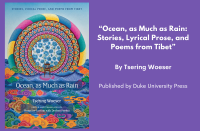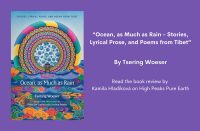
High Peaks Pure Earth has translated a profile of Tibetan film director Pema Tseden that was circulated via WeChat on August 1, 2018. The profile focuses on Pema Tseden’s new film, “Jinpa”.
The world premiere of “Jinpa” was this past week at the Venice Film Festival and the film will continue to be screened at the Toronto International Film Festival next week and the Vancouver International Film Festival after that.
Thank you to Palden Gyal for the translation.
Tibetan Film Director Pema Tseden:
“Jinpa” is Different From All My Earlier Films
On July 25, the Venice Film Festival announced the list of films that made to its 75th edition. Amongst them, “Jinpa” by the director Pema Tseden with executive producers Wong Kar-wai and Jacky Pang also made it to the prestigious film festival in the category of Orizzonti (Horizons). This category encourages works of avant-garde and creative adventures that capture the aesthetical undercurrent as well as the direction of future international films. This is also the only film from China that made it to this competitive category this year. The film narrates the story of a Khampa man’s pursuit of a personal enemy, the murderer of his father, and a truck driver who accidentally knocks dead a sheep on the road. Their encounter on the boundless and obscure wilderness of a photogenic highway sets in motion a story of retribution and redemption.
This film is a fusion adaptation of Tsering Norbu’s short story “The Murderer” and Pema Tseden’s own short story “Jinpa”. Pema Tseden states that there is a special form of expression in the story, i.e. besides the elements of communicating the realism of tradition; there is also an aspect of anti-realism in it. Tseden explains that although it is a story of revenge and redemption, its main theme is about future and hope. It attempts to present and perform the mutual antithesis of dreamland and reality as the subject of expression. The film largely relies on the use of multi-colour techniques, yet there is a also a part that is monochrome.

From the photographs taken from the scene, under the vast and boundless sky with towering snow mountains in the distant horizon, and a Tibetan man dressed in traditional chuba standing alone in the middle of a highway; the very physical landscape incites a dream-like feeling. While writing the script, Pema Tseden doesn’t create a strict division or systematic arrangement of the parts at the outset with regard to either theme or content of the story, instead, it seems to be more his own intuition that guides the format, accomplishes the design of his characters, and steers the direction of the plot. Pema Tseden throws himself into the creative process of filmmaking only after completing the script. He also received the Best Screenplay award at the 19th Busan Film Festival (2014) in its Asian Project Market (APM) edition.
One of the advantages of being both the script writer and the director is that the director can follow the elements of scene, atmosphere and the state of affairs precisely as imagined in writing while filming. It brings more inspiration for creativity as well as conditions for imagination during the shooting process. Concerning content requirements, Pema Tseden’s choice of shooting location is the high-altitude region of Kekexili, which is on the Tibetan plateau 5000 meters above the sea level with thin atmospheric oxygen and a scarce supply of water and electricity. Before its shooting even began, the crew’s make-up artist had to pay an emergency visit to a local hospital as a result of a reaction to the high altitude. During the shooting, the cast and crew was provided with a medical team in order to prevent any incidents of health problems. The difficult shooting environment did not enervate the crew members even as filming went on. Everyone worked hard in solidarity in the face of adversity. The shooting was completed and concluded on time, a period of forty days.

“Jinpa” is Pema Tseden’s first collaboration with Jet Tone Films. Since the past few years, the internationally acclaimed director Wong Kar-wai has been diligently supporting talented and exceptional filmmakers under the banner of Jet Tone Films. Speaking on why he collaborated with Pema Tseden, Wong Kar-wai explains that he really admires the sincere dedication and devotion that is reflected in the works of Tseden. He emphasises, “we should pay more attention and give more support to filmmakers who also write their scripts.” With regard to his role as executive producer, Wong Kar-wai participated thoroughly in the creative process of “Jinpa” from perusing the script to filming. Pema Tseden affirms, “[Wong Kar-wai] is a genuine executive producer in the true sense of the term. He won’t compel you to accept his views, but often offers some concrete suggestions, which aid to perfect the film.” In the creative process, Pema Tseden stresses that he does not really draw a line between commercial and art films. He asserts that, “it is very important for the story to fit its narrative form.” He also considers how audiences might receive a work as he articulates: “creative work is a kind of self-expression, but film, unlike other forms of artistic expression, has the attribute of a commodity that demands thinking with care and rigour.”
The acclaimed Tibetan filmmaker Pema Tseden who makes films in Tibetan language is a multi-talented individual of multiple identities who is also an accomplished novelist and a literary translator. His earlier films include “The Tibetan Trilogy”: “The Silent Holy Stones,” “The Search” and “Old Dog” which received many international and national film awards. His films attempt to explore, probe into and painstakingly chronicle the complexities of Tibetan life in the midst of immense social transformation. Tibetans wrestle with the conundrum and quandary of holding fast to traditional lifestyle and embracing modernity at the same time, and the course of this struggle gives people fresh insights into Tibetan culture and the question of its survival and sustainability.

Following “The Tibetan trilogy,” “Tharlo” was Pema Tseden’s fifth Tibetan language film, which was selected in the 72nd edition of the Venice Film Festival (2015) in the competitive “Horizons” category. It received over twenty international and domestic awards including Best Screenplay award at the 52nd Taiwan Golden Horse Film Festival & Awards. Furthermore, it was screened in domestic cinemas in China in 2016 and garnered considerable positive criticism and reviews in the film industry.

Beginning with the director Tian Zhuangzhuang’s “The Horse Thief” (1986), films about Tibet and Tibetan life have gradually entered the realm of popular cinema. Last July, director Zhang Yang’s “Paths of the Soul” became a huge hit as confirmed by both box office record and public response. It prompted much public attention and interest in Tibetan films. In June of this year, director Sonthar Gyal’s “Ala Changso” was awarded the Best Screenplay award as well as a Jury’s Choice award at the Shanghai International Film Festival. In July, with Pema Tseden as the executive producer, the young and dashing director Lhapal Gyal released his debut film “Wangdrak’s Rain Boots” which received the Best Director award at the FIRST International Film Festival (earlier, it was selected in the 68th edition of the Berlin Film Festival in its “New Generation” category). Just when the [unfavourable] perception of interest in folklore as an exercise in seeking novelty is fading way, more and more Tibetan language films are cropping up.

In Pema Tseden’s view, this kind of development in the Tibetan language films will considerably broaden the [discursive] space and subject matter of Tibetan films. It will also bring favourable conditions for the financing of films. However, holistically speaking, Tibetan language films still occupy only a marginal niche.
One of the changes that progress in science and technology has brought about is a cultural kind, i.e. films and economic development are closely related. Unfortunately, natural geography, economic resources and so forth restrict Tibetan regions in many ways. There are no cinemas in many of the [remote] Tibetan regions. Speaking of cinemas, Pema Tseden notes, “only by watching on the big screen one can truly experience and enjoy films with a sense of tactile immediacy, detail, and atmosphere etc. If you take a broad view of the entire Tibetan linguistic world, we have tough work ahead and a long way to go in the creative enterprise of filmmaking.” Through his art films and meeting with people, Tseden also hopes to deepen his audience’s understanding and appreciation of art films in order to nurture a culture and community of film lovers.
In Pema Tseden’s perspective, film and literature, like art, have an identical position as a medium of expression, but also a different aspect. After around a century of gradual development and growth, film has already separated off literature and other arts as a distinct form of expression, and it has its own language, [that is] “the script serves the image. If the image is not transformed, then it doesn’t have much significance. Obviously, literature can also enhance content and enrich imagery of films.”
Specifically, on the subject of films, Pema Tseden challenges his audience to be able to have their own understanding and viewpoints: “the outcome of a creative work is not give the audience an answer. Every spectator on account of his or her own experiences, circumstances, attainment, culture and other factors would usually arrive at different understandings of the same work. As a director, the expression of the self is concluded as soon as the film is completed. One cannot only have one’s own view about a [film], but also it is predestined to encounter with different views and opinions from its audiences. The question of how audiences understand a film is their issue. The audiences also seek to find through the films their own expressions and understandings.”
After finding out that “Jinpa” made it to the Venice International Film Festival, Pema Tseden thinks that it had a good beginning. As to whether it could win an award or not, he wants to let nature take its course.

From shooting the first short film “The Silent Holy Stones” to “Jinpa,” and having embarked on the journey of filmmaking for over a decade, Pema Tseden senses a quite magical feeling as he deliberates: “In those days, the chances of entering in the films and television industry was slight. Like any other individual among an audience, I just loved film. Later, I had the opportunity to attend the Beijing Film Academy, and then slowly embarked on this creative journey. Many a times you don’t really know what will become of yourself. Life is wonderful!”
In response to what film means to him and what this question really implies, Pema Tseden ponders for a long time and then returns: “Initially, it was a passion, but ever since assuming filmmaking as a profession, it has become a part of my life – one of the many ways of expressing myself.”
By Fu Mengzhen, China Film Director’s Guild
August 1, 2018





Follow Us!